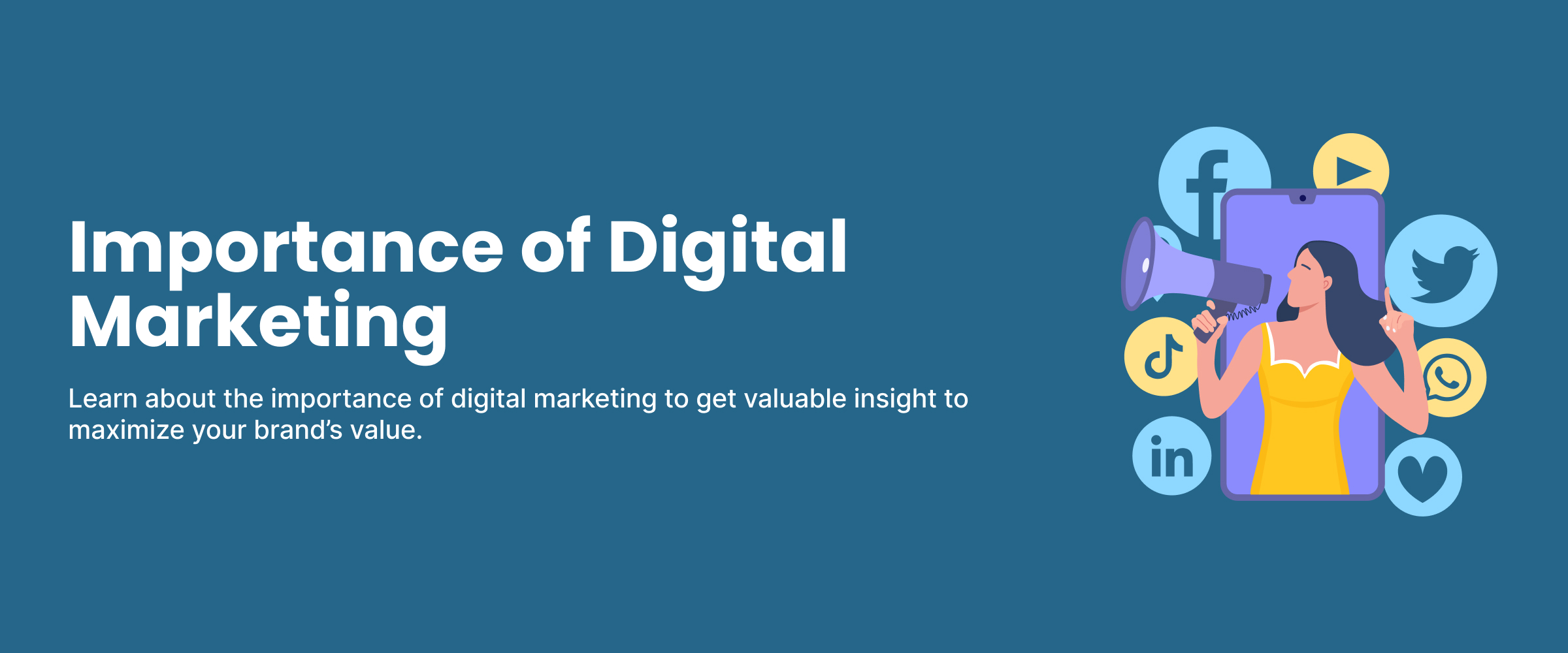Importance of Digital Marketing
The Digital advertising and marketing market is projected to reach $786.2 billion by 2026. It makes the importance of digital marketing undeniable in the rapidly evolving business landscape. The convergence of various influential factors has driven a significant shift towards digital strategies that enable businesses to connect, engage, and thrive in the online realm. In this blog, we will discuss the importance of digital marketing, and explore challenges and future trends in this sphere.
What is Digit Marketing?
Digital marketing is the practice of promoting products or services using online channels, like social media, search engines, email, and websites. It aims to reach and engage target audiences through various digital platforms, fostering brand awareness, and customer engagement, and ultimately driving conversions and sales. To understand the techniques to effectively navigate the digital landscape and achieve marketing success you can refer to an online Digital Marketing course.
The key components of digital marketing are as follows:
Why is Digital Marketing Important for Business?
Recognizing the importance of digital marketing has revolutionized business strategies. In a world driven by technology, its benefits extend beyond tradition, propelling modern marketing success. Here are some key advantages of embracing digital marketing:
Global Reach
Businesses are empowered with unparalleled opportunities for global reach. The power of digital marketing transcends borders, connecting brands with a diverse international audience. Here are some important aspects of global reach:
- Wider Audience Access – Digital marketing allows businesses to reach a vast global audience that was previously unreachable through traditional methods. The internet’s widespread use ensures that your brand message can be accessed by people from different countries and cultures.
- Personalization – With global reach comes the ability to personalize content and campaigns for different regions and demographics. Tailoring your messages to local preferences and languages enhances customer engagement and increases the likelihood of conversions.
- 24/7 Availability – Your digital marketing efforts can reach potential customers in different time zones, allowing your brand to maintain a consistent presence around the clock. This accessibility increases your chances of capturing leads and making sales at any time of day.
Cost-Effectiveness
In Business promotion, achieving cost-effectiveness is paramount. Using and understanding the importance of digital marketing brings forth a range of advantages that optimize resources and enhance outcomes. Here are some important aspects for better cost-effectiveness:
- Budget Flexibility – Unlike traditional advertising, digital marketing doesn’t require a huge upfront investment. You can start with a small budget and scale up as you see positive results.
- Targeted Advertising – Digital marketing enables precise audience targeting using demographics, interests, and online behavior, minimizing ad spend wastage by reaching those most likely to be interested in your offerings.
- Measurable Results – Digital marketing offers real-time analytics for tracking campaign performance. Key metrics like clicks, impressions, conversions, and ROI can be measured, aiding in campaign optimization.
- Cost-Per-Click (CPC) Control – With digital advertising platforms, you can set a maximum CPC, ensuring that you don’t exceed your budget for each click on your ads.
- Elimination of Print Costs – Digital marketing eliminates the need for printing materials like brochures, flyers, and posters, saving money on production and distribution.
- Global Reach at Lower Costs – Online advertising allows you to reach a global audience without the costs associated with international marketing campaigns.
- A/B Testing – Digital marketing lets you run A/B tests to experiment with different ad creatives, headlines, and strategies. This data-driven approach helps refine your campaigns and improve their cost-effectiveness.
Personalization and Customer Engagement
Personalization and customer engagement are crucial benefits of digital marketing in online businesses. Here are some points that elaborate on these aspects:
- Tailored Content – Digital marketing enables businesses to craft personalized content by analyzing user behavior using cookies and analytics tools. With insights into customer preferences, businesses tailor the content accordingly and enhance engagement.
- Segmentation – Digital marketing enables businesses to segment their audience using various criteria like demographics and interests. This allows them to send personalized messages to specific groups, increasing engagement rates.
- Customized Email Campaigns – Behavioral tracking enhances email marketing by enabling personalized campaigns. By addressing recipients by name and tailoring content to their interests, businesses can boost open rates and conversions.
- Dynamic Website Content – Websites can display dynamic content that changes based on user interactions and preferences. This keeps visitors engaged by showing them products, services, or content that aligns with their interests.
Explore the best digital marketing placement guarantee course to master all the concepts of digital marketing.
Challenges in Digital Marketing
Adapting to Algorithm Changes
Digital platforms frequently update algorithms to improve user experience, affecting how content is ranked, displayed, and targeted. It has a significant impact on website traffic, visibility, and conversions. It might influence ad placements and costs.
Understanding new algorithms requires time and effort. Marketers need to study, test, and refine their strategies to align with updated guidelines, often leading to a learning curve before optimal performance is achieved. Therefore, algorithm updates can disrupt strategies and impact various facets of online campaigns.
Privacy Concerns
Ensuring the security of customer data is a constant challenge, as cyberattacks and data breaches can lead to unauthorized access and potential misuse of personal information. Growing concerns about data privacy can erode consumer trust in businesses because people are becoming more cautious about sharing their information online.
Data Protection Regulations
GDPR and similar global regulations enforce stringent guidelines for businesses regarding the collection, processing, and storage of customer data. These privacy regulations often restrict the types and amount of data that can be collected without explicit user consent. It can limit the effectiveness of targeted advertising and personalized marketing efforts.
Factors Driving the Shift Towards Digital Marketing
Despite the challenges, the shift towards digital marketing is being propelled by a convergence of influential factors. Here are some factors responsible for the shift toward digital marketing:
- Internet Penetration – The widespread availability of the Internet has connected billions of people globally, creating a vast online audience for businesses to tap into.
- Social Media Boom – The explosive growth of social media platforms has provided businesses with direct access to engage with users, build communities, and leverage user-generated content for marketing purposes.
- Mobile Revolution – The proliferation of mobile devices has revolutionized how consumers access information, pushing businesses to adapt their marketing strategies for smaller screens and on-the-go consumption.
- Data Analytics – Digital marketing benefits from data analytics tools that offer insights into consumer behavior, helping businesses refine their strategies based on real-time data.
- Targeted Advertising – Digital platforms allow for precise targeting based on demographics, interests, and online behaviors, leading to higher conversion rates and reduced wastage of resources.
Future Trends in Digital Marketing
The Digital space is evolving, how can digital marketing not? Here are some important aspects of future trends in digital marketing:
- Rise of AI and Automation – The ascent of AI and automation is reshaping digital marketing. With AI-driven tools, tasks like data analysis, personalization, and chatbots are streamlined, optimizing campaigns and enhancing customer experiences. Predictive analytics and advanced applications are on the horizon, promising increased efficiency and effectiveness.
- Voice Search and Smart Devices – Voice search and smart devices are shaping the way consumers interact with technology, and subsequently, how marketers reach their target audiences. The rise of virtual assistants like Siri, Google Assistant, and Alexa has led to an increasing reliance on voice commands for searching the internet, making inquiries, and even shopping.
- Video Marketing and Live Streaming – Future digital marketing will witness the ongoing surge of video marketing and live streaming. High engagement levels and real-time interactions make them crucial. Short-form video on platforms like TikTok also gains prominence, demanding quality, creativity, and relevance for effective audience connection.


Conclusion
In the digital era, businesses must understand the importance of digital marketing such as global reach, affordability, and personalization. Challenges like algorithm shifts and privacy require adaptation. Future trends like AI, voice search, and video marketing offer growth potential. Understanding these aspects is crucial for business success.
Did you find this blog interesting? Tell us in the comments about other benefits of digital marketing.







